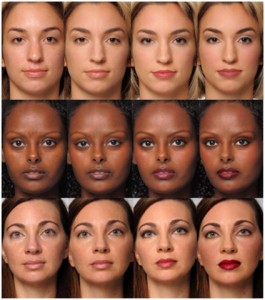Can’t make this one up.
Pardon the pun but the results of this particular study, published last week in PLOS One, deserves some attention, not because it conveys a positive message but because it challenges me I know at the cellular level by confirming that as humans, we often focus on the wrong attributes. And in no gender is this truer than in women, who are often judged for what’s on the surface rather than what lies within.
Two studies conducted by Harvard Researcher and Assistant Clinical Professor at Harvard, Nancy Etcoff, PhD, were developed to examine how adorning a face with colour cosmetics affects how other individuals will respond. These studies were seen as a natural extension of prior research that has shown that facial beauty influences first impressions and increases beliefs that the beautiful are more socially skilled, confident, successful and even more competent.
A bit of background…
Cosmetics have had a long history of controversy and shifting cultural mores. For example, in the 10,000 BC, cosmetics were used by both Egyptian men and women to enhance their spirituality and stature. In the late 18th Century, cosmetics (along with perfumes, scented water/washes and “paints”) were banned from being used to snare a husband. Thereafter in the Victorian Era, there was a return to the natural look and the fragility of women and cosmetic enhancement was frowned upon. In more modern times and we’ve gone from painting the town red in the 1920s to au natural in the 40s back to glamour in the 50s and a return to au natural in the 70s. Today, the researchers write, “cosmetics are seen as freely chosen and morally neutral agents of beauty enhancement…reflecting the individual’s preferences and choices, and the response to their use reflects” the perceiver’s ideas about makeup use and what is says about a person’s personality, intentions and character. In other words, how you look still influences what others’ think and feel about you.
The research
Etcoff’s research findings take us one step further towards substantiating that as a culture, our priorities are seriously askew. In it, she and her colleagues asked over 200 men and women to rate the same 25 female faces (Hispanic, Caucasian or African American models) with our without color cosmetics and wearing various degrees of makeup (minimal to moderate to dramatic or more specifically, ‘natural,’ ‘professional,’ or ‘glamourous’ looks). The models were rated for attractiveness, likability, trustworthiness and competence on a 7 point scale (ranging from not at all to highly/extremely).
[Photo: doi:10.1371/journal.pone.0025656.g001]
The researchers found that when the models’ were viewed for only 250 milliseconds, makeup increased ratings of their attractiveness, likability and trust. When viewers had more time to look at the faces, only the natural and professional make up looks increased the degree to which the models were perceived as likable, professional, competent and trustworthy. Still when the researchers contrasted the glamorous look to no make up at all, the found that viewers rated the models as likable, competent and significantly more attractive; only trustworthiness was questioned.
Overall, the findings show that increased beauty can be equated with increase social power and competence and to a lesser extent, how warmly someone is perceived. And researchers say that “attractiveness has assumed increasing significance [in our culture] and wil continue to do so as long as beauty remains an unconscious proxy for status and ability.”
Proctor and Gamble’s Principal Scientist of Color Cosmetics takes this even one step further, claiming, in a related press release that “makeup is a real life tool in [the female arsenal that allows women] to effectively control the way they want to be — and are — perceived.” The message? Makeup is king in a manipulator’s toolbox. And in order to take control and be in control, women need to manipulate their image.
What happens when that image is taken away from them and they are “found out?” And truly, what messages are we sending?
The other day I ran across a trailer for Miss Representation, a documentary about how women and girls are perceived our culture and how these views are influenced by the media. I would like to suggest that perhaps, we are both the influencers and the influenced.
I guess it comes down to this one question:
What makes the woman? It’s up to all of us to decide.








Very interesting – and I yes, I also think that it’s up to us to decide what makes the woman.
I could not agree more about the P&G study and the manipulation angle. Thanks for writing about this!
It’s an ‘interesting’ take on relevant research. The original study had a lot more to say than “arm yourselves with lipstick and you shall succeed.”
I think the study findings cannot lead to any conclusions unless compared to a study that does the exact same thing with men and makeup.
I’m pretty sure you’d find the same findings with women doing the rating of men…
The conclusion may not be that makeup helps WOMEN manipulate others’ perception of them, it may be that altering one’s physical appearance, regardless of gender, allows one to manipulate others’ perception.
Then it becomes less a statement about gender and more about altered physical appearance… but who knows, I’m speculating without an equivalent study of men.
I respectfully disagree, since in our culture, it is primarily women who are altering their appearance and who have to fight against the aging paradigm and becoming invisible and irrelevant as they age. The data are there and are consistent. I am happy to look at other findings if you can produce them.